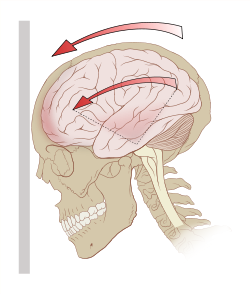Concussion

Editor-In-Chief: Prab R Tumpati, MD
Obesity, Sleep & Internal medicine
Founder, WikiMD Wellnesspedia &
W8MD medical weight loss NYC and sleep center NYC
| Concussion | |
|---|---|

| |
| Synonyms | Mild traumatic brain injury (mTBI), mild head injury (MHI) |
| Pronounce | N/A |
| Specialty | N/A |
| Symptoms | Headache, confusion, dizziness, nausea, vomiting, fatigue, memory problems |
| Complications | N/A |
| Onset | Immediate or delayed |
| Duration | Days to weeks |
| Types | N/A |
| Causes | Traumatic brain injury |
| Risks | Contact sports, falls, motor vehicle accidents |
| Diagnosis | Clinical diagnosis, neuroimaging |
| Differential diagnosis | Intracranial hemorrhage, cervical spine injury |
| Prevention | Protective headgear, seat belts, fall prevention |
| Treatment | Rest, cognitive rest, gradual return to activities |
| Medication | N/A |
| Prognosis | Good with proper management |
| Frequency | Common, especially in contact sports |
| Deaths | N/A |
File:Traumatic Brain Injury (TBI) in Kids.webm





== Concussion ==
A concussion is a type of traumatic brain injury (TBI) caused by a blow to the head or body, a fall, or another injury that jars or shakes the brain inside the skull. Concussions can also occur from a violent shaking of the head or upper body. This injury can lead to a temporary loss of normal brain function.
Symptoms[edit]
Symptoms of a concussion can vary widely and may include:
- Headache
- Confusion
- Dizziness
- Nausea
- Vomiting
- Fatigue
- Blurred vision
- Sensitivity to light and noise
- Memory loss
- Difficulty concentrating
Symptoms can appear immediately or may not be noticed until days or weeks after the injury.
Diagnosis[edit]
Diagnosing a concussion typically involves a physical examination and a review of the patient's medical history. Neurological examinations and cognitive tests may be conducted to assess the severity of the injury. In some cases, imaging tests such as CT scans or MRIs may be used to rule out more serious brain injuries.
Treatment[edit]
The primary treatment for a concussion is rest. This includes both physical and mental rest to allow the brain to heal. Patients are often advised to avoid activities that could result in another concussion, such as contact sports. Over-the-counter pain relievers may be used to manage headaches. In some cases, a healthcare provider may recommend a gradual return to normal activities under supervision.
Prevention[edit]
Preventing concussions involves taking precautions to avoid head injuries. This includes wearing appropriate protective gear during sports, using seat belts in vehicles, and making living environments safer to prevent falls.
Long-term Effects[edit]
While most people recover fully from a concussion, some may experience long-term effects. These can include persistent headaches, memory problems, and difficulties with concentration. Repeated concussions can lead to more serious conditions such as chronic traumatic encephalopathy (CTE).
See also[edit]
- Traumatic brain injury
- Post-concussion syndrome
- Chronic traumatic encephalopathy
- Second-impact syndrome
- Brain injury
- Neurology
References[edit]
<references group="" responsive="1"></references>
External links[edit]
Ad. Transform your life with W8MD's Budget GLP-1 injections from $75


W8MD offers a medical weight loss program to lose weight in Philadelphia. Our physician-supervised medical weight loss provides:
- Weight loss injections in NYC (generic and brand names):
- Zepbound / Mounjaro, Wegovy / Ozempic, Saxenda
- Most insurances accepted or discounted self-pay rates. We will obtain insurance prior authorizations if needed.
- Generic GLP1 weight loss injections from $75 for the starting dose.
- Also offer prescription weight loss medications including Phentermine, Qsymia, Diethylpropion, Contrave etc.
NYC weight loss doctor appointmentsNYC weight loss doctor appointments
Start your NYC weight loss journey today at our NYC medical weight loss and Philadelphia medical weight loss clinics.
- Call 718-946-5500 to lose weight in NYC or for medical weight loss in Philadelphia 215-676-2334.
- Tags:NYC medical weight loss, Philadelphia lose weight Zepbound NYC, Budget GLP1 weight loss injections, Wegovy Philadelphia, Wegovy NYC, Philadelphia medical weight loss, Brookly weight loss and Wegovy NYC
|
WikiMD's Wellness Encyclopedia |
| Let Food Be Thy Medicine Medicine Thy Food - Hippocrates |
Medical Disclaimer: WikiMD is not a substitute for professional medical advice. The information on WikiMD is provided as an information resource only, may be incorrect, outdated or misleading, and is not to be used or relied on for any diagnostic or treatment purposes. Please consult your health care provider before making any healthcare decisions or for guidance about a specific medical condition. WikiMD expressly disclaims responsibility, and shall have no liability, for any damages, loss, injury, or liability whatsoever suffered as a result of your reliance on the information contained in this site. By visiting this site you agree to the foregoing terms and conditions, which may from time to time be changed or supplemented by WikiMD. If you do not agree to the foregoing terms and conditions, you should not enter or use this site. See full disclaimer.
Credits:Most images are courtesy of Wikimedia commons, and templates, categories Wikipedia, licensed under CC BY SA or similar.
Translate this page: - East Asian
中文,
日本,
한국어,
South Asian
हिन्दी,
தமிழ்,
తెలుగు,
Urdu,
ಕನ್ನಡ,
Southeast Asian
Indonesian,
Vietnamese,
Thai,
မြန်မာဘာသာ,
বাংলা
European
español,
Deutsch,
français,
Greek,
português do Brasil,
polski,
română,
русский,
Nederlands,
norsk,
svenska,
suomi,
Italian
Middle Eastern & African
عربى,
Turkish,
Persian,
Hebrew,
Afrikaans,
isiZulu,
Kiswahili,
Other
Bulgarian,
Hungarian,
Czech,
Swedish,
മലയാളം,
मराठी,
ਪੰਜਾਬੀ,
ગુજરાતી,
Portuguese,
Ukrainian
